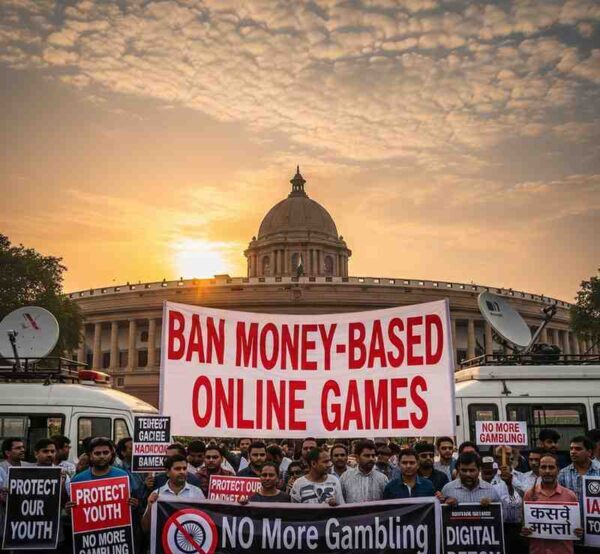India has passed a landmark bill banning money-based online games, sending shockwaves through the gaming industry. Learn what the new law covers, the penalties for violations, its impact on fantasy sports and e-sports, and what comes next for players and platforms.
Introduction
India’s rapidly expanding online gaming sector has encountered a major legal hurdle. On August 20, 2025, the Parliament passed the Promotion and Regulation of Online Gaming Bill, 2025, a law that bans all forms of online games involving monetary stakes. This includes not just gambling-style apps but also fantasy sports and real-money skill-based gaming platforms that have gained immense popularity in recent years.
The law has drawn mixed reactions: while supporters argue it will protect vulnerable users from addiction and financial harm, critics warn it could severely damage one of the country’s fastest-growing digital industries. Here’s a detailed look at what the bill entails, its introduction, and its implications for players, businesses, and India’s digital economy.
What the Online Gaming Bill, 2025, Covers
The new law prohibits any online game where players stake or transfer money in exchange for potential winnings. This ban extends to:
- Fantasy Sports Platforms like Dream11, My11Circle, and MPL.
- Casino-style games such as poker, rummy, and online slots.
- Betting and Gambling Apps disguised under “skill-based” formats.
Additionally, the bill prohibits the advertising, marketing, or promotion of money-based games on social media, streaming platforms, or television.
However, the law draws a clear line between e-sports (competitive video gaming without monetary stakes) and real-money games. E-sports are not just permitted but actively promoted through the proposed establishment of a National E-Sports Authority to regulate and nurture the industry.
Penalties Under the New Law
The government has introduced stringent penalties to deter violations:
- First-time offenders may face fines up to ₹50 lakh and imprisonment of up to three years.
- Repeat offenders face fines of more than ₹1 crore and up to five years in prison.
- App marketplaces and internet service providers that host or fail to block illegal platforms may also be penalized.
Such stringent provisions reflect the government’s clear objective of phasing out monetary online gaming from the digital ecosystem.
Why Did the Government Introduce This Law?
This prohibition is the result of prolonged discussions on the broader social and financial implications of online gaming. Key concerns that shaped the bill include:
- Addiction and Financial Losses: Thousands of families have reported financial distress due to online gaming addiction, especially among youth.
- Legal Ambiguity: Courts across India had repeatedly delivered conflicting judgments on whether fantasy sports and real-money games were games of “skill” or “chance.” The bill provides a uniform national framework.
- Consumer Protection: Unlike traditional gambling laws, online games were largely unregulated, creating loopholes that allowed companies to operate with minimal accountability.
- Digital Well-Being: The government framed the law as part of its broader effort to ensure safe and responsible use of technology.
Impact on India’s Online Gaming Industry
India’s online gaming industry has been experiencing rapid growth. In 2023, the industry was valued at over $3.5 billion, with projections to hit $8–10 billion by 2027. Companies like Dream11, MPL, and Zupee had become household names, attracting massive foreign investments and millions of daily users.
The new law now puts this growth story in jeopardy:
- Business Closures: Major real-money gaming companies will either have to shut down or pivot to non-monetary models.
- Job Losses: The industry employed over 50,000 people directly and indirectly—many of these jobs may now be at risk.
- Investor Sentiment: Global investors, who had poured billions into India’s gaming startups, may scale back funding.
- E-Sports Opportunity: On the flip side, e-sports companies stand to benefit as the government has pledged to promote competitive gaming and build infrastructure for tournaments and digital sports events.
Public and Industry Reactions
The response to the bill has been polarized:
- Supporters: Many parents and educators have welcomed the ban, citing rising cases of students falling into debt traps due to gaming. Public health advocates also see it as a step toward reducing behavioral addictions.
- Critics: Industry players argue that the ban unfairly lumps skill-based games with gambling, despite Supreme Court precedents that recognized skill as a differentiating factor. They warn of a parallel black market where unregulated apps continue to thrive outside legal oversight.
Some states may also challenge the law, as “betting and gambling” traditionally fall under state jurisdiction in the Constitution. Legal battles are therefore expected in the months ahead.
What’s Next for Players and Platforms?
For players, the immediate impact is clear: all money-based online gaming apps will soon be unavailable on app stores and websites. Any attempt to play or promote such games could expose users to penalties.
For platforms, survival now depends on pivoting to new models:
- Free-to-Play Games: Focus on in-game purchases and ad revenues instead of monetary stakes.
- E-Sports and Skill Competitions: Leverage the government’s support for e-sports to organize tournaments without cash entry fees.
- International Markets: Some Indian companies may shift operations abroad while blocking Indian users to comply with domestic law.
Conclusion
The Promotion and Regulation of Online Gaming Bill, 2025, marks a turning point for India’s digital economy. By banning money-based online games, the government hopes to curb addiction, protect consumers, and set clear boundaries in the gaming sector. Yet the law also disrupts an industry that had become a major source of jobs, innovation, and investment.
As India balances the fine line between regulation and innovation, one thing is clear: the future of gaming in the country will look very different. Whether this move ultimately protects citizens or stifles a promising industry will depend on how effectively the government enforces the ban while supporting alternatives like e-sports.
Read More:

























